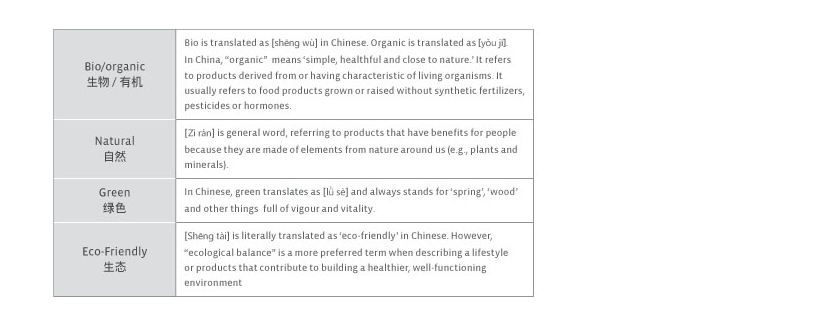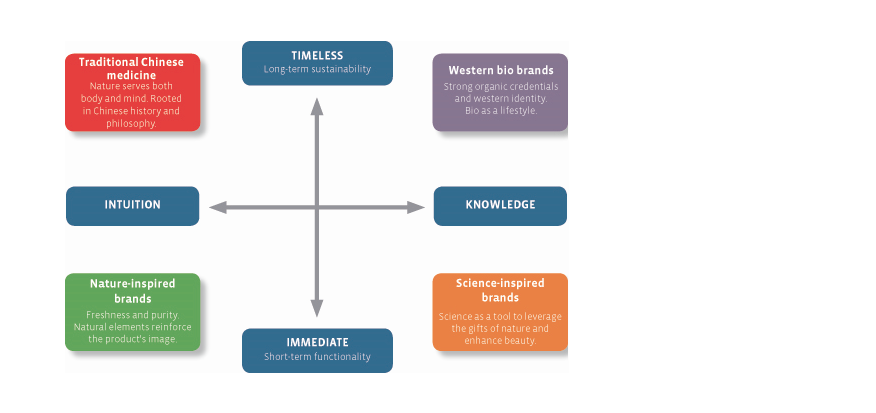

Do Chinese perceive organic/natural products the way Westerners do? What are the real motivations and driving forces behind Chinese customers’ rising interest in these products? Ever since China started to shift its position from the world’s dominant manufacturing powerhouse to the world’s biggest and most attractive consumer market, the consumption habits of Chinese consumers also started to move toward increasing maturity and sophistication. This trend is perceived as a tremendous opportunity for organic brands entering China and competition in this market is intensifying. In such an environment, the key success factor is to identify what Chinese people really expect from these types of products and build brand identities that are locally relevant.
Different perspectives on “bio” between the West and China
Fundamental differences indeed exist between the way Western and Chinese customers understand and perceive concepts such as “bio” “organic,” or “green” and the benefits they expect from such products.
In the realm of cosmetic brands, the Western market has long been acquainted with organic products. The concepts associated with these products are clearly defined, and consumers possess a well-formed understanding of their attributes. Western consumers have seamlessly incorporated organic and natural products into their consumption routines, with clear expectations. The consumption of organic cosmetics is not just a choice; it’s perceived as a lifestyle statement. The associated benefits lean toward the more intangible and long-term aspects rather than immediate and concrete outcomes.

Table 1: The different notions between the West and China
What are the Chinese understandings of the organic/natural concept?
In a nutshell, the concept of “organic” is not so explicit in China. Consumers may be attracted to organic/natural products but their understanding of the term “natural” is more pragmatic than in the West. To most customers, a “natural” lifestyle simply means eating more fruits and vegetables. One explanation is the lack of widely accepted labels or certifications for organic or bio products that would give another dimension to these concepts.
The following chart details how key concepts related to organic/natural products translate into Chinese.

Chinese translation of bio concepts
The way the Chinese see the concept of “eco-friendly” illustrates an interesting aspect of the Chinese psyche that makes the Chinese public potentially very receptive to nature-based messages. Chinese philosophy sees the environment as an interconnected whole, an equilibrium that must be maintained. This perception of nature and the environment permeates the Chinese mind and makes Chinese consumers likely to be drawn toward organic/natural products. What is more, China has a long history of using the gifts of nature to cure illnesses and traditional Chinese medicine has been an important part of people’s lives for centuries. Moreover, China is still a country in which scandals involving unsafe food products are counted by the dozen. People still often live in an environment characterized by uncertainty and seek security in their consumption choice.
Examining cosmetic brands provides further insights into market diversity
All of the aforementioned factors make the market for organic/natural products in China more multidimensional than in the West. Labbrand’s market research department has recently conducted an extensive study of organic and natural cosmetic brands in China. The results show the extent to which the market for organic and natural products in China is diverse and multidimensional. The following chart describes how the market for bio and nature-based products can be divided along two axes.


This group represents the western conception of “organic.” Brands in this category are western (confirming the observation that “organic” is strongly linked to the west in Chinese people’s minds) and can be defined as lifestyle brands. They use their heritage as a point of differentiation and project an image of authenticity.

Brands that are inspired by traditional Chinese medicine (TCM). They put forth in their communication material plants known in China for their curative effects. They play on typically Chinese concepts such as balance and harmony and often blend modern science with Chinese medical traditions.

The “nature inspired” group is rather heterogenic. Brands in this group emphasize elements such as freshness and purity rather than insisting on the medical properties of the plants used. Some brands present certain products as “organic” but their credentials are not strong enough to be placed in the “bio brands” category.

The last group, science inspired brands, can be seen as the most sophisticated. Brands in this group borrow codes from the pharmaceutical industry and use technical terms extensively to describe how they use modern science to leverage nature’s gifts. They are mostly foreign and emphasize their scientific credentials and the complexity of their products.
All in all, the cosmetics example perfectly illustrates the complexity and uniqueness of the organic and natural products in China. In the future, as discretionary spending power rises and the market evolves, we can expect the “organic brands” segment to become a more important part of the market.
In the face of escalating concerns about environmental pollution and its impact on health, an increasing number of consumers are embracing bio and organic lifestyles, driven not only by a desire for internal well-being but also by a growing aversion to products that contribute to environmental damage. The potential for organic products is substantial in this rapidly evolving market. However, the adoption of “Bio” and “Organic” may differ in China compared to the West, likely resonating primarily with a high-income but limited group of early adopters. The success of brands in capitalizing on this trend depends on their ability to leverage market data and position themselves in a locally relevant way in this still nascent market for cosmetic brands.
DOWNLOAD REPORT
A Labbrand Group Company © 2005-2024 Labbrand All rights reserved
沪ICP备17001253号-3* Will be used in accordance with our Privacy Policy
To improve your experience, we use cookies to provide social media features, offer you content that targets your particular interests, and analyse the performance of our advertising campaigns. By clicking on “Accept” you consent to all cookies. You also have the option to click “Reject” to limit the use of certain types of cookies. Please be aware that rejecting cookies may affect your website browsing experience and limit the use of some personalised features.